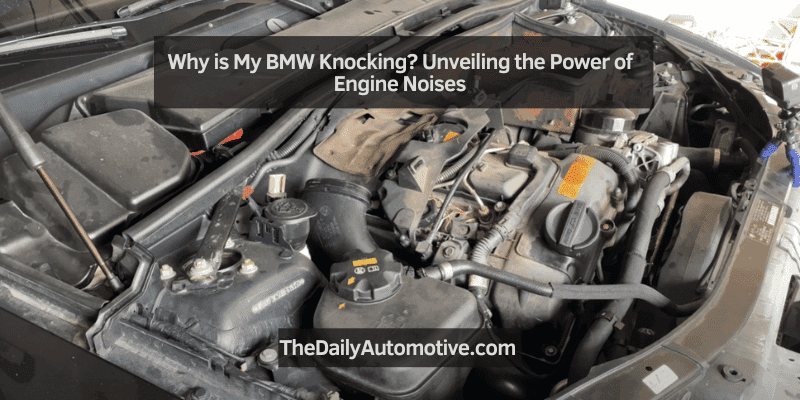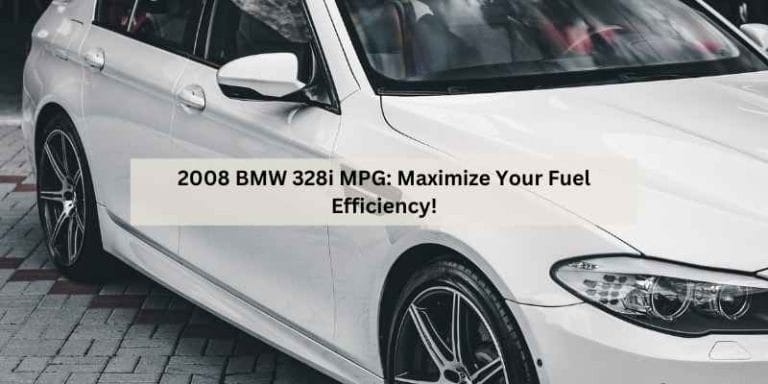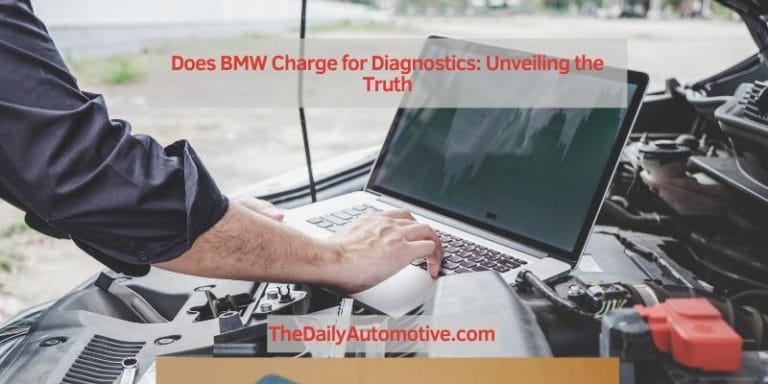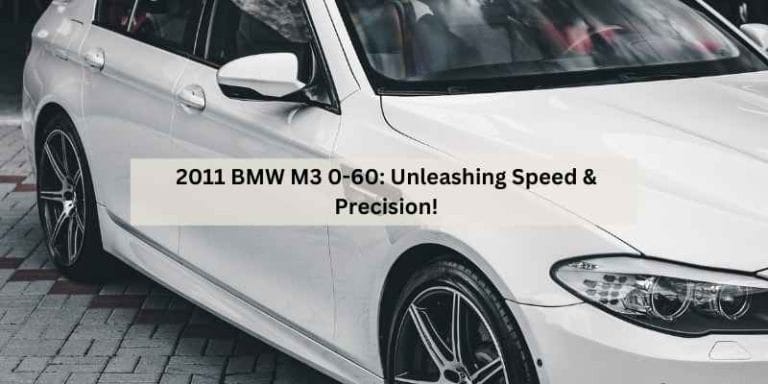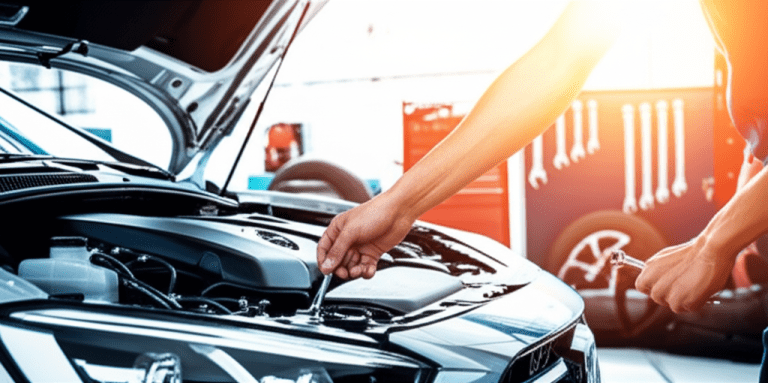Why is My BMW Knocking? Unveiling the Power of Engine Noises
The knocking sound from your BMW could be due to engine problems such as worn out bearings or damaged piston components. If you hear a knocking sound coming from your BMW, it could be a sign of engine issues.
The knocking sound may indicate problems with the engine’s bearings or piston components. These parts can wear out over time, leading to decreased performance and potential engine damage. It’s important to address this issue promptly to prevent further damage and costly repairs.
How Engine Noises Can Be An Indicator Of Problems
If you’re wondering why your BMW is knocking, it could be a sign of engine problems. Unusual engine noises should be addressed to prevent further damage and ensure optimal performance.
Common Engine Noises In Bmw Cars
- Knocking sound: One common engine noise in BMW cars is a knocking sound. This noise is often caused by issues with the fuel-air mixture or carbon deposits in the combustion chamber. It is important to identify and address this noise early to prevent further damage to the engine.
- Clicking or tapping sound: Another engine noise that BMW owners may encounter is a clicking or tapping sound. This noise can be indicative of a problem with the valve train, such as worn or damaged lifters. It is crucial to address this noise promptly to avoid potential engine failure.
- Whirring or whining sound: A whirring or whining sound coming from the engine can be a sign of a problem with the belts, pulleys, or bearings. These components may become worn or misaligned over time, causing the noise. Timely inspection and repair are essential to prevent further damage.
Importance Of Identifying Engine Noises Early
Identifying engine noises early is crucial for maintaining the performance and longevity of your BMW. Ignoring unusual sounds can lead to more serious issues and expensive repairs down the line. Here are some reasons why it is important to address engine noises promptly:
- Prevent further damage: Engine noises can be early indicators of underlying problems. By addressing them promptly, you can prevent further damage to engine components and avoid more extensive repairs.
- Save money on repairs: Identifying and resolving engine noise issues early can save you money on repairs. Small problems that are caught early are generally less costly to fix than major issues that require extensive repairs or component replacements.
- Ensure safety and reliability: Engine noises can affect the safety and reliability of your vehicle. By addressing them promptly, you can ensure that your BMW is performing as intended and minimize the risk of breakdowns or unexpected malfunctions.
- Preserve engine performance: Engine noises often indicate problems that can impact the overall performance of your BMW. By attending to these issues early, you can maintain optimal engine performance and enjoy a smooth and enjoyable driving experience.
Remember, if you notice any unusual engine noises in your BMW, it is important to have them inspected and addressed by a qualified mechanic. Early intervention can save you time, money, and hassle in the long run.
Primary Causes Of Engine Knocking In Bmws
BMW engine knocking can be caused by a variety of factors, including incorrect fuel octane, carbon buildup, or a faulty spark plug. It is important to address the issue promptly to avoid more severe damage to the engine.
Engine knocking is a concerning issue that BMW owners may encounter. This disruptive noise, often described as a repetitive knocking or pinging sound, can indicate underlying problems within the engine. If left unaddressed, it can lead to severe damage and costly repairs.
In this section, we will explore the primary causes of engine knocking and provide insights into fuel-related issues, ignition system problems, and engine overheating.
Fuel-Related Issues:
- Low-quality fuel: Using poor-quality fuel with insufficient octane rating can result in engine knocking. This occurs when the air-fuel mixture ignites prematurely, leading to erratic combustion and knocking noises.
- Carbon deposits: Over time, carbon deposits can accumulate on the fuel injectors and intake valves. These deposits disrupt proper fuel atomization and air-fuel mixing, potentially causing knocking.
- Incorrect fuel-air mixture: A lean fuel-air mixture (excess air) can cause the engine to generate higher temperatures, leading to knocking. Conversely, a rich fuel-air mixture (excess fuel) can result in incomplete combustion and knocking.
Ignition System Problems:
- Spark plug issues: Worn out or incorrect spark plugs can cause engine knocking. If the spark plugs fail to ignite the air-fuel mixture correctly, knocking can occur.
- Ignition timing: Incorrect ignition timing can lead to premature combustion, causing the air-fuel mixture to ignite before the piston reaches the optimal position. This mistimed combustion can produce knocking sounds.
- Faulty ignition coils: Malfunctioning ignition coils may result in uneven combustion, leading to engine knocking. These coils are responsible for delivering the high voltage required to ignite the air-fuel mixture in each cylinder.
Engine Overheating:
- Cooling system problems: A malfunctioning radiator, coolant leaks, or a faulty thermostat can cause the engine to overheat. Elevated temperatures inside the engine can lead to pre-ignition of the fuel-air mixture, resulting in knocking.
- Insufficient lubrication: If the engine lacks sufficient lubrication, friction between the moving parts can generate excessive heat. This can contribute to higher temperatures and increase the likelihood of engine knocking.
To ensure the longevity of your BMW’s engine and prevent engine knocking, it is vital to address any potential fuel-related issues, ignition system problems, or engine overheating promptly. Regular maintenance, such as using high-quality fuel, replacing spark plugs as recommended, and addressing any cooling system concerns can help prevent engine knocking and optimize the performance of your cherished BMW.
Addressing Fuel-Related Issues
Discover why your BMW is knocking and learn effective ways to address fuel-related issues in your vehicle. Explore solutions for improving fuel quality and optimizing performance without breaking the bank.
A BMW is a powerful and sophisticated vehicle, but even the best machines can experience issues from time to time. One common problem that BMW owners come across is engine knocking. If you’ve noticed a knocking sound coming from your BMW, it’s crucial to investigate and address the issue promptly.
In this section, we will focus on fuel-related problems that can lead to engine knocking and provide tips to prevent this issue.
Investigating Low Fuel Quality
Low-quality fuel can have detrimental effects on your BMW’s engine performance. Here’s what you should consider when investigating fuel-related issues:
- Check the fuel source: Ensure that you are purchasing fuel from reputable gas stations that adhere to strict quality standards.
- Contaminants in the fuel: Low-quality fuel may contain impurities, such as dirt or water, which can affect the combustion process. Consider using fuel additives to reduce the impact of contaminants.
- Fuel storage conditions: Improper storage of fuel can lead to degradation over time. Ensure that the fuel you use is fresh and has been stored correctly.
- Fuel filter: A clogged or dirty fuel filter can restrict the flow of fuel to the engine, leading to knocking. Regularly inspect and replace your fuel filter as recommended by BMW.
Understanding The Effects Of Incorrect Fuel Octane Rating
The octane rating of fuel determines its resistance to knocking. Using fuel with the incorrect octane rating can result in engine knocking. Here’s what you need to know:
- BMW’s recommended octane rating: Check your owner’s manual to determine the octane rating recommended by BMW for your specific model. Using a lower octane fuel can cause knocking.
- Detonation and pre-ignition: Using fuel with an octane rating that is too low can lead to premature ignition of the fuel-air mixture, causing knocking. This can result in engine damage if not addressed promptly.
- Higher octane rating: Using a fuel with a higher octane rating than recommended is usually unnecessary and can be a waste of money. Stick to BMW’s guidelines for the best performance without engine knocking.
Tips To Prevent Engine Knocking Due To Fuel Issues
To ensure smooth engine operation and prevent knocking, follow these simple tips:
- Use the recommended octane rating: Always fill up your BMW with fuel that matches the octane rating recommended by BMW. This will help prevent knocking and maintain optimal performance.
- Choose reputable gas stations: Purchase fuel from well-known gas stations that prioritize quality control measures. This will reduce the risk of fuel-related issues.
- Fuel additives: Consider using high-quality fuel additives that can help cleanse and protect your engine. These additives can also minimize the effects of low-quality fuel or contaminants.
- Regular maintenance: Ensure your BMW receives regular maintenance, including fuel filter replacements and inspections. This will help detect and address any potential fuel-related issues before they escalate.
Remember, addressing fuel-related issues promptly is vital to maintaining the performance and longevity of your BMW. By investigating low fuel quality, understanding the effects of incorrect fuel octane ratings, and following our preventative tips, you can prevent engine knocking and enjoy a smooth driving experience in your BMW.
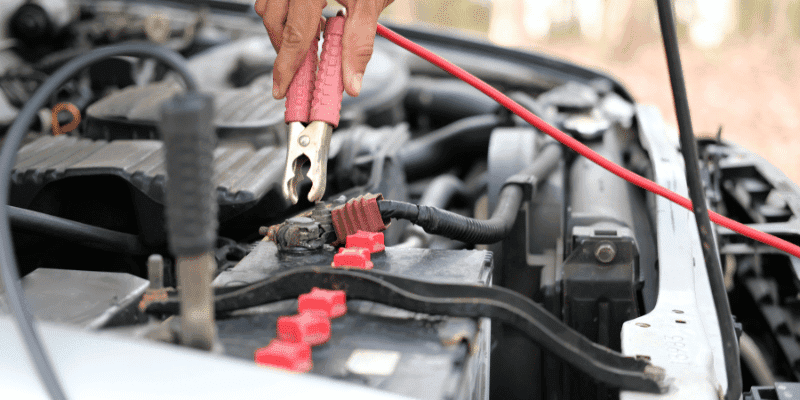
Resolving Ignition System Problems
Experiencing a knocking sound in your BMW? It could be due to ignition system problems. Resolve this issue promptly to prevent further damage to your vehicle.
Knocking noise coming from your BMW can be quite worrisome, especially if you’re unsure of the underlying cause. One potential culprit behind this issue is a problem with the ignition system. In this section, we’ll focus on how to resolve ignition system problems in your BMW.
Diagnosing Faulty Spark Plugs:
- Check the condition of the spark plugs: Look for signs of wear, such as black, oily deposits or worn electrodes.
- Inspect the spark plug wires: Ensure they are properly connected and in good condition.
- Use a spark plug tester: This tool can help identify if the spark plugs are providing a consistent spark.
Checking Ignition Timing:
- Use a timing light: This tool allows you to check the ignition timing and ensure it aligns with the manufacturer’s specifications.
- Inspect the timing belt or chain: If the timing is off, it could be due to a worn or loose timing belt or chain. If necessary, consult a professional to replace these components.
Replacing Ignition Coils:
- Locate the ignition coils: These are typically situated on top of the engine, connected to the spark plugs.
- Remove the old ignition coils: Carefully disconnect the wires and unbolt the coils from their mounting brackets.
- Install new ignition coils: Attach the new coils, ensuring they are securely bolted and the wires are properly connected.
By following these steps, you can effectively resolve ignition system problems in your BMW. Remember, if you’re uncertain or uncomfortable performing these tasks yourself, it’s always advisable to consult a certified mechanic or BMW specialist for assistance.
Preventing Engine Overheating
If your BMW is knocking, it could be a sign of engine overheating. Prevent this issue by regularly checking coolant levels, inspecting the radiator for any signs of damage, and ensuring proper airflow through the cooling system. Regular maintenance can help avoid costly engine repairs down the line.
Is your BMW engine constantly making a knocking sound? Engine knocking can be a cause for concern and may indicate underlying issues with your vehicle. One common cause of engine knocking is overheating. In this section, we will discuss the importance of coolant levels, identifying radiator issues, and checking for thermostat problems to prevent engine overheating.
Importance Of Coolant Levels
To prevent engine overheating, it is crucial to maintain optimal coolant levels in your BMW. Here’s why coolant levels matter:
- Coolant helps regulate the engine temperature by absorbing and dissipating heat.
- Insufficient coolant levels can lead to a decrease in cooling performance and cause the engine to overheat.
- Regularly checking and topping up coolant levels can help prevent potential issues in the cooling system.
Identifying Radiator Issues
The radiator plays a crucial role in keeping your BMW’s engine cool. Here are some signs of radiator issues to watch out for:
- Leaking coolant: Check for any visible coolant leaks around the radiator area. Leaking coolant can cause a drop in coolant levels and subsequently lead to engine overheating.
- Damaged or corroded fins: Inspect the radiator fins for any damage or corrosion. Damaged fins can hinder the airflow, reducing the radiator’s cooling efficiency.
- Blockage: A clogged radiator can restrict the flow of coolant, resulting in engine overheating. Look for signs of blockage, such as debris or sediment trapped in the radiator core.
Checking For Thermostat Problems
A malfunctioning thermostat can also contribute to engine overheating. Here’s what you can do to check for thermostat problems:
- Check for temperature irregularities: If your BMW’s temperature gauge is constantly fluctuating or shows abnormally high readings, it may indicate a faulty thermostat.
- Cold engine symptoms: If your engine takes an unusually long time to warm up or fails to reach normal operating temperature, it could be a sign of a stuck open thermostat.
- Overheating issues: On the other hand, a stuck closed thermostat can cause the engine to overheat rapidly.
Preventing engine overheating in your BMW is crucial for maintaining its performance and longevity. Regularly monitoring coolant levels, identifying radiator issues, and checking for thermostat problems can help safeguard your engine from potential damage. By taking these preventative measures, you can enjoy a smoother driving experience without worrying about engine knocking.

Credit: www.bmwblog.com
Additional Factors To Consider When Diagnosing Engine Noises In Bmws
When diagnosing engine noises in BMWs, there are additional factors to consider. A knocking sound in your BMW could be caused by issues like worn-out spark plugs, low-quality fuel, or loose engine components. Proper examination is crucial to pinpoint the exact cause and address it effectively.
Your BMW is a precision machine, and any unfamiliar noises coming from the engine can be an alarming sign that something may be amiss. While a knocking sound can be concerning, there are a few additional factors to consider when diagnosing engine noises in BMWs.
By examining belts and pulleys, checking for exhaust leaks, and evaluating the air intake system, you can further narrow down the potential causes of the knocking sound.
Belts And Pulleys Inspection:
- Start by visually inspecting the belts and pulleys in your BMW’s engine compartment. Look for signs of wear, such as cracks or missing pieces.
- Check the tension of the belts by pressing down on them. They should have some give but not be too loose. If they are too tight, it can put additional strain on the pulleys.
- Listen for any squealing or grinding noises that may indicate a problem with the belts or pulleys.
- Ensure that the belts are properly aligned and not misaligned, as this can cause knocking sounds.
Checking For Exhaust Leaks:
- Inspect the exhaust system for any visible signs of leaks, such as holes or loose connections.
- Listen for any hissing or popping sounds that may indicate an exhaust leak.
- Pay attention to any unusual smells, such as a strong odor of exhaust fumes inside the cabin or outside the vehicle.
Evaluating The Air Intake System:
- Examine the air filter to ensure it is clean and free from debris. A clogged air filter can restrict airflow and lead to engine noises.
- Check the air intake hoses for any cracks or loose connections. Leaks in the air intake system can disrupt the engine’s air-fuel mixture and cause knocking sounds.
- Inspect the throttle body for any carbon build-up or dirt that may be causing irregular airflow.
By taking the time to inspect these additional factors, you can gather more information about the source of the knocking sound in your BMW’s engine. Remember, if you are unsure or uncomfortable with diagnosing the issue yourself, it is always best to consult with a qualified mechanic or BMW specialist.
Professional Maintenance And Repair Solutions
If your BMW is making a knocking sound, our professional maintenance and repair solutions can diagnose and fix the issue. Trust us to deliver high-quality service for your luxury vehicle.
If you’re experiencing a knocking sound in your BMW, it’s important to address it promptly to avoid further damage to your engine. Professional maintenance and repair solutions can help diagnose and resolve the issue effectively. Here are some benefits of regular engine inspections and the importance of seeking professional assistance:
Benefits Of Regular Engine Inspections:
- Early detection: Professional engine inspections can uncover potential issues before they worsen, saving you from costly repairs down the line.
- Enhanced performance: Regular inspections ensure that all components of your engine are in optimal condition, improving your car’s overall performance.
- Prolonged engine life: Identifying and fixing problems early on can help extend the lifespan of your engine, keeping it running smoothly for years to come.
- Improved fuel efficiency: A well-maintained engine operates more efficiently, resulting in better fuel economy and cost savings.
Importance Of Professional Diagnosis And Repair:
- Accurate assessment: Trained technicians have the knowledge and expertise to accurately diagnose the cause of your BMW’s knocking sound, ensuring the correct repair solutions are applied.
- Specialized equipment: Professional service centers are equipped with advanced diagnostic tools and software specifically designed for BMWs, enabling them to pinpoint issues accurately.
- Genuine parts and expertise: Choosing a reputable service center ensures that only genuine BMW parts and qualified technicians are used for repairs, guaranteeing the highest quality workmanship.
- Warranty protection: If your BMW is still under warranty, seeking professional repairs ensures that your warranty remains intact, saving you from unexpected expenses.
Selecting A Trustworthy Bmw Service Center:
- Reputation and experience: Look for a service center with a proven track record and years of experience working with BMW vehicles.
- Certifications and affiliations: Check if the service center is certified by BMW or affiliated with reputable automotive organizations, ensuring they meet industry standards.
- Customer reviews: Read online reviews and testimonials from previous customers to gauge the service center’s reputation and customer satisfaction levels.
- Transparent pricing: A reliable service center will provide transparent pricing, ensuring you are aware of the costs involved before any repairs are made.
- Warranty coverage: If your BMW is still under warranty, make sure the service center is authorized to perform warranty repairs without voiding your coverage.
When it comes to the maintenance and repair of your BMW, it’s crucial to trust the expertise of professionals who specialize in working with these luxury vehicles. By opting for regular inspections and relying on professional solutions, you can keep your BMW running smoothly and enjoy a safe and comfortable driving experience.
So, don’t hesitate to seek professional maintenance and repair services for your BMW if you notice any knocking sounds or other issues.
Frequently Asked Questions For Why Is My Bmw Knocking
What Causes Bmw Engine To Knock?
The knocking in a BMW engine can be caused by various factors, such as carbon deposits, low-quality fuel, and engine misfiring.
How Can You Fix Engine Knocking?
To fix engine knocking, first determine the cause, such as using the wrong fuel or worn spark plugs. Replace the faulty components, and avoid excessive engine load or high RPM.
What Is The Tapping Sound From Bmw Engine?
The tapping sound from BMW engine could be caused by several factors, such as worn valve lifters or a loose timing chain. It is important to have it inspected and repaired by a professional mechanic.
Why Is My Car Making A Knocking Noise?
Your car is making a knocking noise due to potential issues with the engine or parts within it.
Conclusion
To summarize, if your BMW is making knocking sounds, it is crucial to diagnose and address the issue promptly. These sounds can be indicative of serious problems within the engine, suspension, or fuel system. Ignoring these knocks can lead to further damage and costly repairs down the road.
Regular maintenance, such as changing the oil and filter, and checking the spark plugs, fuel injectors, and camshaft sensors, can help prevent knocking. It is also essential to use high-quality fuels and lubricants. When dealing with knocks, it is important to consult a professional mechanic who specializes in BMWs.
By addressing the underlying cause of the knocking, you can ensure the optimal performance and longevity of your beloved BMW. Don’t delay – take action and keep your BMW running smoothly for many more miles to come.

